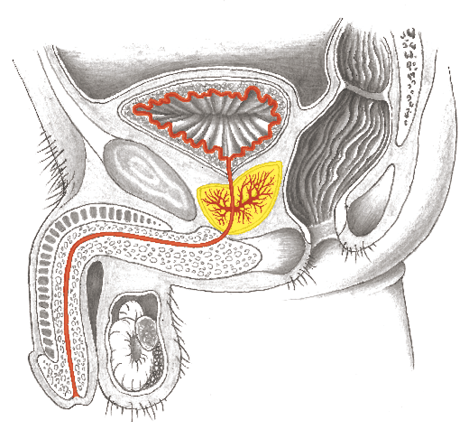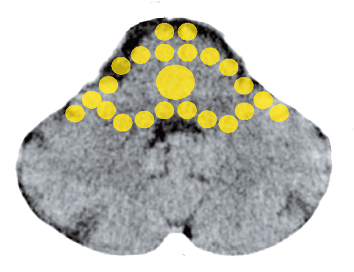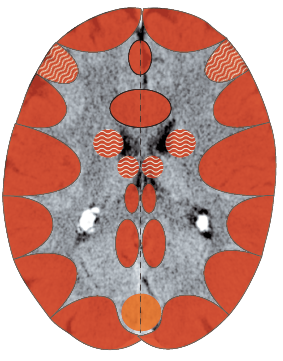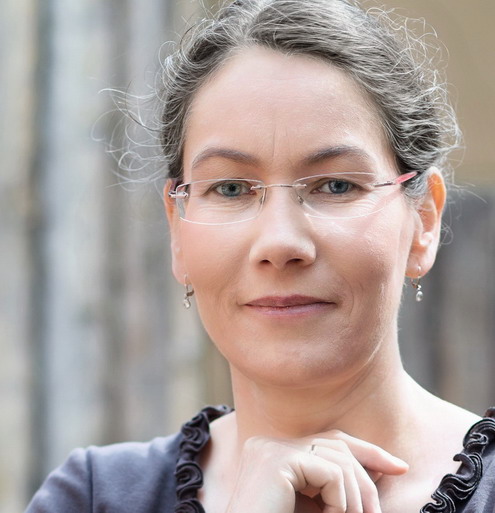 The information on this site is from one of the most famous books about the New Medicine (GNM / 5BN): "The Psychic Roots of Diseases" by Björn Eybl. Since September 2025, it is available in the form of an app with many additional features.
The information on this site is from one of the most famous books about the New Medicine (GNM / 5BN): "The Psychic Roots of Diseases" by Björn Eybl. Since September 2025, it is available in the form of an app with many additional features.It was written in german and was translated into more than 10 languages already. German is not freely available, as the rights are held by a publisher, but all these translations are available as ebooks / PDFs for free, as a gift of Björn for you, for the New Earth, for a new time.
In cooperation with Björn, it is splitted on "Disease is Different" into the sections by organ systems and combined with the real cases of our international testimonial / report archive of the related organ system.
PROSTATE GLAND
The prostate gland is partly attached to the base of the bladder and is made up of a muscle complex embedded with endodermal glands. It produces an alkaline secretion. The urethra goes through the middle of this chestnut-sized organ. The deferent duct (vas deferens) also leads to the urethra in the prostate gland.
The ectodermal, urothelium-lined prostatic ductules (ductuli prostatici) discharge the prostatic secretion from the prostate gland into the urethra. Seminal fluid is made up of 40% prostatic secretion. Upon the release of seminal fluid (ejaculation), it is mixed with prostatic secretion, and with the help of involuntary muscle activity is pushed out through the urinary-seminal tract. The prostatic secretion gives the seminal fluid its typical musk – a chestnut-blossom odor. The smell of musk is an aphrodisiac and thus, sexually arousing.
Prostate Parenchyma
Sexual conflict,
conflict with regard
to the man’s duties

Prostate Ducts
Territory marking
conflict with
sexual aspect

Enlargement of the prostate (prostatic hyperplasia), prostate cancer (adeno-ca)1
| Conflict | 1. Sexual conflict, problems with regard to procreation. One does not feel manly (potent) enough. One doubts his own manliness or erectile function. Stress due to “abnormal” sexual perception (e.g., not married in a Catholic family, homosexuality). According to Dr. Hamer: “ugly-genital conflict” most often found in older men, who no longer react to territorial conflicts. 2. Conflict with regard to the “man’s duties” (satisfying a woman, having children, etc.). 3. According to Frauenkron-Hoffmann: A belief that one has not passed on the right impulses or enough maturity to his child for its life (e.g., motivation, ambition, education, behavior). |
|---|---|
| Examples | ➜ A man wants to but cannot (potency problem) or he wants to but may not (the woman doesn‘t want to or would prefer a different man). In the midst of divorcing his wife, the patient meets a young woman, who offers him everything that he could want sexually. During the divorce proceedings, he finds out that this woman is passing important information to his wife‘s lawyer – she is betraying the patient = sexual conflict. In the active–phase, his PSA value climbs to just over 4. Although the patient shows no symptoms, a prostate puncture (cell sample) is taken. After 18 punctures, a few proliferating cells are found and a diagnosis of testicular cancer is made. After the prostate gland has been removed, the patient finds himself impotent and partly incontinent. During the course of chemotherapy, he begins seeking an alternative and gets to know the 5 Biological Laws of Nature. Impotence is another sexual conflict for the man > cell division in the area of the sphincter > urine retention > OP > radiation… (Archive B. Eybl) In the midst of divorcing his wife, the patient meets a young woman, who offers him everything that he could want sexually. During the divorce proceedings, he finds out that this woman is passing important information to his wife‘s lawyer – she is betraying the patient = sexual conflict. In the active–phase, his PSA value climbs to just over 4. Although the patient shows no symptoms, a prostate puncture (cell sample) is taken. After 18 punctures, a few proliferating cells are found and a diagnosis of testicular cancer is made. After the prostate gland has been removed, the patient finds himself impotent and partly incontinent. During the course of chemotherapy, he begins seeking an alternative and gets to know the 5 Biological Laws of Nature. Impotence is another sexual conflict for the man > cell division in the area of the sphincter > urine retention > OP > radiation… (Archive B. Eybl) A 46-year-old executive employee has an extra-marital relationship. When he decides to end the affair, his mistress threatens to destroy his family = sexual conflict. In the active stage, his PSA value soars to 46. The patient knows about the 5 Biological Laws of Nature and refuses conventional therapy. He confesses to his wife and she forgives him = conflict resolution. During the repair phase, the patient suffers for several days from severe urine retention. The PSA value drops back to 2. As a result of the affair, the patient suffers from gingival atrophy (see: p.226). (Archive B. Eybl) A 46-year-old executive employee has an extra-marital relationship. When he decides to end the affair, his mistress threatens to destroy his family = sexual conflict. In the active stage, his PSA value soars to 46. The patient knows about the 5 Biological Laws of Nature and refuses conventional therapy. He confesses to his wife and she forgives him = conflict resolution. During the repair phase, the patient suffers for several days from severe urine retention. The PSA value drops back to 2. As a result of the affair, the patient suffers from gingival atrophy (see: p.226). (Archive B. Eybl) A patient notices that his wife is being unfaithful. He remains conflict–active for 15 years, because he cannot let go of the situation. (Archive B. Eybl) A patient notices that his wife is being unfaithful. He remains conflict–active for 15 years, because he cannot let go of the situation. (Archive B. Eybl) A father learns that his grown daughter is regularly being forced to have sex with her partner = substituting for his daughter, he feels a sexual conflict. (Archive B. Eybl) A father learns that his grown daughter is regularly being forced to have sex with her partner = substituting for his daughter, he feels a sexual conflict. (Archive B. Eybl) |
| Conflict-active | Conflict–active Increase in function, growth of a cauliflower-like prostate (adeno-ca) tumor = cell growth in the prostate gland, rise in the PSA value. With prolonged conflict activity, swelling pressure > restricted fluid flow > difficulty urinating. |
| Bio. function | Production of more prostatic secretion > stronger musk odor in the urine and sperm signals potency and the readiness to mate to the female, furthermore, with more sperm, he can be more impressive > older man shows females that he is not yet “over the hill“ and can keep up with the younger men. More prostatic secretion also increases motility, lifespan and the protection of genetic material in sperm. |
| Repair phase | Normalization of function, tubercular, caseating necrotic degradation of the tumor = stinking, murky, possibly bloody urine; pain, inflammation (prostatitis), swelling, night sweats, mild fever. If no bacteria is present: symptom-free encapsulation of the tumor. Often, urine retention, but not always, because the prostate gland has enough space to expand out wards. Usually, a recurring conflict. PSA value The enzyme PSA is produced primarily in the prostate gland and is a rough parameter for the size of the prostate gland or tumor. Unfortunately, it is a fact that the more often PSA values are measured, the more men die of prostate cancer. Regular checks of the PSA value and follow-up biopsies are, from the viewpoint of the 5 Biological Laws of Nature, unwise. For patients that do not know the 5 Laws, just being told that something is wrong with their prostate gland can trigger a further conflict. This is especially the case with diagnoses of “prostate cancer” (usually based on a biopsy). |
| Questions | When did the symptoms begin? (Usually a few months/years lead time). Which conflict is there with regard to manliness, sexual intercourse, eroticism? I want to, my partner doesn’t? I am unable? Do I feel as old as the hills? Do I think that I am perverse? Do I believe that I’m not a good/real man? Do I condemn my sexual uniqueness? Am I worried about the development of my child? Do I feel like I failed as a parent? What conditioned me? (E.g., religious upbringing, father’s style with regard to women/sexuality)? Did ancestors also have issues with their prostate? (Yes > work out the family issue) Do I identify too strongly with my gender? Who am I? What is the meaning of life? |
| Therapy | Determine the conflict, trigger(s) and conditioning and resolve it. Guiding principles: “There are more important things than sex and sexual potency!“ “I will no longer base my identity on that.“ “I will let go of this dependency.“ “I enjoy my freedom and my new quality of life.“ “What will count when it’s all over?” “Bless you my child, in whichever direction your life develops.” CM: transurethral resection, (TUR) or prostate surgery (prostatectomy) often leads to impotence and incontinence. = New prostate conflict and possibly a worsening of the conflict. Local self-esteem conflicts affecting the pelvis. CM: “bone metastases.“ 5 Biological Laws of Nature: TUR or surgery should never be performed due to elevated PSA levels or test-biopsy, but only if it is necessary to reduce symptoms (prolonged urinary retention). Prior to that, use natural resources (see remedies for the prostate gland p. 318) and, if necessary, try CM, alpha blockers. Chemotherapy, radiation, and hormonal blockade therapy are not recommended. |
Gonorrhea in men
Same SBS as above (see: p.315). Symptom is purulent discharge in the morning, some pus comes out before the first urine (= so-called “bonjour drip”).
| Phase | Repair phase or persistent repair: degradation of prostate tumor tissue, presence of pus in the urine; odorous, murky, possibly bloody urine, “bonjour drips,” night sweats. |
|---|---|
| Note | Like many other men in the 18th and 19th centuries, Vincent Van Gogh and Paul Gauguin suffered from gonorrhea. There is ample documentation of their indiscriminate, “impure” sex with likewise “impure” women, the latter even having sex with children. Gonorrhea is only rarely diagnosed nowadays. This is due to effective prostate tumor treatments becoming more and more available. Thus, symptoms do not progress past prostatitis with purulent discharge. After a long, active, territorial-marking conflict, pus can be discharged during the repair phase if the connective tissue under the mucosa is also affected. |
| Therapy | The conflict is resolved. Support the healing. Colloidal silver internally. MMS or antibiotics if the repair phase is too intense. See remedies for the prostate p. 318. |
1 See Dr. Hamer, Charts pp. 24, 35

Urine retention without significantly high PSA values (intraductal
prostatic cancer, prostatic intraepithelial neoplasia = PIN)
| Conflict | Territorial-marking conflict with sexual aspect (= combination of prostate and bladder conflict). |
|---|---|
| Examples |  A 60-year-old employee has a wife, who has never had much interest in sex. After the birth of their second child, she no longer wants sex at all = territorial-marking conflict with sexual aspect. Over the years, he suffers from worsening complications with urination = recurring–conflict in persistent repair > chronic repair-swelling of the prostatic excretory ducts. (Archive B. Eybl) A 60-year-old employee has a wife, who has never had much interest in sex. After the birth of their second child, she no longer wants sex at all = territorial-marking conflict with sexual aspect. Over the years, he suffers from worsening complications with urination = recurring–conflict in persistent repair > chronic repair-swelling of the prostatic excretory ducts. (Archive B. Eybl) A patient‘s disapproves of the man his daughter married. However, the couple has a child to whom the patient feels very attached. Every time he and his wife want to visit their grandchild, their son-in-law thwarts their plans by taking the child away. Since then, he has suffered from urine retention = territorial-marking conflict with sexual aspect. (Archive B. Eybl) A patient‘s disapproves of the man his daughter married. However, the couple has a child to whom the patient feels very attached. Every time he and his wife want to visit their grandchild, their son-in-law thwarts their plans by taking the child away. Since then, he has suffered from urine retention = territorial-marking conflict with sexual aspect. (Archive B. Eybl) A farmer‘s wife is 10 years younger than he is. Because he doesn‘t allow her to smoke in the house, she regularly visits the neighbor to smoke and drink coffee. During a visit to check on his wife, the farmer sees his wife sitting between the neighbor and his child all arm-in-arm. Although the situation was just an innocent coincidence, the farmer becomes suspicious and begins having problems urinating. When the couple is told what the cause is, the wife stops visiting the neighbor = territorial-marking conflict with sexual aspect. (See: Berger-Lenz, Ray, faktor-L, Neue Medizin, Band 1). A farmer‘s wife is 10 years younger than he is. Because he doesn‘t allow her to smoke in the house, she regularly visits the neighbor to smoke and drink coffee. During a visit to check on his wife, the farmer sees his wife sitting between the neighbor and his child all arm-in-arm. Although the situation was just an innocent coincidence, the farmer becomes suspicious and begins having problems urinating. When the couple is told what the cause is, the wife stops visiting the neighbor = territorial-marking conflict with sexual aspect. (See: Berger-Lenz, Ray, faktor-L, Neue Medizin, Band 1). |
| Conflict-active | Conflict–active Slackening of the smooth ring-formed musculature in the prostatic excretory ducts. Later, cell degradation, usually unnoticed > widening of the lumen. |
| Bio. function | Increase in the diameter through broadening of the ring musculature > better flow > better discharge of prostatic secretions for territorial marking and for “courting.“ For the female, the musk odor is a sign of potency and readiness to mate. |
| Repair phase | Restoration of the urothelium, healing swelling, leading to urine retention, residual urine, for CM: “intraductal prostatic carcinoma (PIN),“ = excessive degradation of urothelium. Most important indication: hardly or slightly raised PSA value. Often, a recurring conflict. |
| Therapy | If the condition does not improve, determine the conflict, trigger(s) and conditioning and resolve. See remedies for the prostate p. 318. |
Remedies for the prostate gland
- In the case of total blockage of the urethra with a backlog of urine, a catheter can bring relief until the swelling decreases. Urine retention will cease when the conflict has been definitely and permanently resolved.
- Yam roots (natural progesterone), linseed oil, pomegranate, saw palmetto, frankincense, stinging nettle preparations.
- For inflammation: enzyme preparations (for example “Wobenzym“), Schuessler Cell Salt no. 3, MMS (see p. 68).
- Hildegard of Bingen: mugwort (Tanecetum vulgaris) elixir special recipe.
- Cod liver oil (see p. 68).
- Selenium, zinc, coenzyme Q10, vitamin B6, C, E.
- Cayce: regular classic massage of the pelvis and legs with peanut oil and olive oil, mixed 1:1, chiropractic.
- Alkaline foods (see p. 65, especially pumpkin/squash, pumpkin seeds, asparagus, oysters, soy, tomatoes (ingredient: lycopene).
- Tea: boxberry (Gaultheria procumbens), fireweed, bearberry, stinging nettle leaf and root, green tea.
- Anti-inflammatory, muscle-relaxing medication (alpha blocker), if needed.
- A transurethral resection of the prostate (TURP) should only be considered if the urethra is permanently blocked due to a backlog of residual urine in the bladder or renal pelvis = recurring–conflict or persistent repair.
- The conventional practice of administering hormone blocking drugs to inhibit testosterone after an surgery is senseless and has many side effects > not recommended. This practice is based on the false assumption that a high testosterone level contributes to carcinoma growth. The fact is that only the PSA value correlates with the testosterone level.
It is advisable to have a blood-hormone analysis done a few weeks after the surgery. If there is a hormone deficiency, the intake of natural progesterone and possibly testosterone would make sense (bioidentical hormones).
It is advisable to have a blood-hormone analysis done a few weeks after the surgery. If there is a hormone deficiency, the intake of natural progesterone and possibly testosterone would make sense (bioidentical hormones).
All experience reports on the organ system “Prostate Gland” from the International Report Archive:
| Author | Title and Overview | Keywords | ||||
|---|---|---|---|---|---|---|
 | 2025/11/10   Swelling of the prostate due to secretion backflow Cause: inflammatory swelling of the ectodermal mucous membrane of the prostate ducts, leading to their obstruction and associated backflow | Territory marking conflict with a gender aspect |
